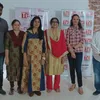Coronavirus pandemic harder on women, but they can cope better: Prof. Dafna
Professor Dafna Kariv, along with other panellists, was speaking at the SmashUp 2020 conference held by TiE Delhi-NCR chapter. The session was focussed on female entrepreneurship and discussed intersections of female entrepreneurship and the current coronavirus crisis.
The coronavirus pandemic has been particularly hard on women-founded startups due to exclusive challenges such as work-life balance, and difficulty in accessing financial resources, even though the economy is dependent on the participation of women entrepreneur, said Professor Dafna Kariv, who teaches at colleges in Israel and other countries.
However, she believes that women do hold an advantage over others to cope with such situations:
“Women entrepreneurs are known to have an advantage relative to men in strategic innovation, and entrepreneurial mindset”, she said, speaking at a one-day online conference 'SmashUp! 2020', organised by TiE Delhi-NCR, a chapter of the global not-for-profit TiE. The conference largely focussed on looking at opportunities for Indian startups to build global brands', and '#VocalforLocal.’

Professor Dafna Kariv speaking at the one-day online conference held by TiE Delhi-NCR (Image courtesy - TiE Delhi NCR's twitter)
The first session of the day focussed on female entrepreneurship, and discussed intersections of female entrepreneurship and the current COVID-19 crisis. The panel included Dr Ron Malka, the Ambassador of Israel, Professor Dafna Kariv, Founding Chair of Novus Entrepreneurship Center, Israel, and Sharon Doron, Head of Retail, WiseSense, a tech company in Israel.
According to a study by Cherie Blair Foundation for Women, 93 percent women respondents had been negatively impacted by the pandemic. 44 percent of those affected had ceased operations temporarily, and 3 percent, permanently. Sectors like beauty, hospitality, travel and tourism, construction, logistics, energy and real estate were amongst most-affected.
But Professor Dafna said that women should see the crisis as a blessing and opportunity to further their entrepreneurial goals by using the “identify, exploit and create” approach.
“Identify would mean look around and see if you can do something with what is around us. ‘Exploit’ would mean to change something so the opportunity is more valid for us and ‘create’ would mean to create something from scratch."
She cited the example of an Italian spirits company that pivoted to make hand sanitisers, and ‘exploited’ the opportunity. Another female entrepreneur took the opportunity provided by the pandemic to create a platform that allowed temporarily employed people to take up temporary jobs and projects with other companies. Closer home, in Palakkad, Kerala, a kindergarten teacher upskilled to provide classes via Zoom.
Dr Ron Malka pointed out that progress of any economy was dependent on participation of all stakeholders, including women entrepreneurs:
“I cannot imagine the success of the Israeli economy without women power, without the significant participation of women in the workforce, both skilled and unskilled,” he said in his address at the conference.

Sharon Doron, Head of Retail at WiseSense speaking at the conference. (Image Courtesy - TiE Delhi NCR's twitter)
Similarly, Sharon Doron pointed out how her tech company, WiseSense, took cues from the ‘new normal’ the world has been forced to adopt, to help fashion stores modify their existing practices. They created new self-checkout stations that provided express checkout options to customers, mobile technology to make shopping experiences more customer-friendly, and smart shelves to keep employee contact and communication to the minimum.
Professor Dafna ended the session saying the pandemic is the right time for women to identify their strengths and capitalise on them, as well as engage in community-building to create a mark which will help in the post-COVID-19 world.
Edited by Aparajita Saxena









